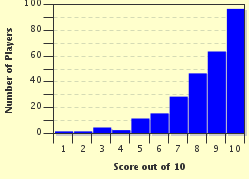Quiz Answer Key and Fun Facts
1. What is a concussion?
2. In a sporting context, in what circumstances can concussions happen?
3. What are some signs of a concussion a coach can identify?
4. How do you best identify whether an athlete has a concussion?
5. Which group of symptoms might an athlete describe if he/she has just been concussed?
6. What is the first basic phase of treatment when a concussion is diagnosed?
7. In 2008/9, what sport (in the USA) resulted in the highest concussion rate for high school athletes?
8. How can you best help prevent concussions?
9. When can a high school athlete return to activity after suffering a concussion?
10. What do former pro athletes Junior Seau, Andre Waters, Ryan Freel, Barry "Tizza" Taylor and Chris Benoit have in common?
Source: Author
Nealzineatser
This quiz was reviewed by FunTrivia editor
rossian before going online.
Any errors found in FunTrivia content are routinely corrected through our feedback system.


